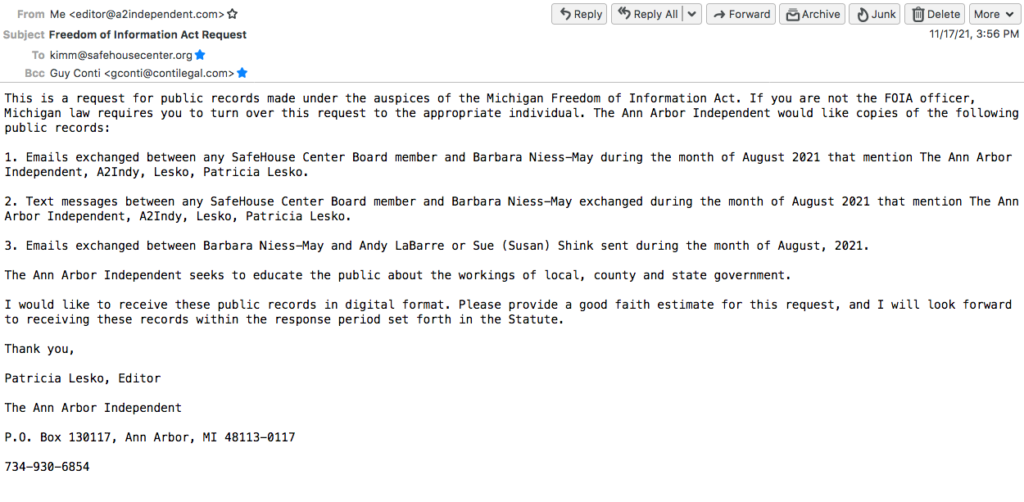SafeHouse Center Sued for Allegedly Violating Michigan’s Freedom of Information and Open Meetings Acts
by P.D. Lesko
1/22/22: This article has been corrected to include a legal explanation as to why SafeHouse Center is allegedly subject to the Open Meetings Act.
The Ann Arbor Independent filed suit in Washtenaw County’s 22nd Circuit Court on Friday January 21, 2022 to compel The Domestic Violence Project Inc. (SafeHouse Center) to turn over public records sought using the Freedom of Information Act (FOIA). The suit also alleges that the SafeHouse Center Board members violated the Michigan Open Meetings Act (OMA). Under the auspices of OMA, the general public should have been properly notified of all SafeHouse Center Board public meetings and given the opportunity to participate.
The newspaper’s lawyer Guy T. Conti says, “SafeHouse is subject to the OMA because a lessee of a public body that carries out an essential function of the public body is subject to OMA. SafeHouse Center leases from the County. By virtue of the millage that the people passed to build the building and the determination by the County Board of Commissioners that a shelter was necessary, SafeHouse Center is a lessee that carries out an essential governmental purpose.”
SafeHouse Board members include public officials Greg Dill, who is the Washtenaw County Administrator, and Washtenaw County Sheriff Jerry Clayton. The SafeHouse Board also includes Barbara McQuade, who is a University of Michigan Law School professor of practice and former U.S. Attorney for the Eastern District of Michigan, and Eddie Washington, Jr., Executive Director of the Office of Public Safety and the University of Michigan.
The Michigan Freedom of Information Act (FOIA) says that non-profit organizations that receive more than half of their funding from state and local authorities are subject to FOIA.
In its fiscal year 2020 IRS 990 income tax form, SafeHouse Center reported $3,194,983 in revenue. Of that total, $1.619 million (51 percent) came from state and local authorities. According to its 2019 IRS 990 tax return, SafeHouse Center received 54 percent of its funding from state and local authorities. The non-profit’s 990 tax returns show that in four of the past six fiscal years, it took in more than 50 percent of its revenue from state and local authorities.
In July 2021, The Ann Arbor Independent broke the story about unsafe and unsanitary conditions at the county’s only domestic violence shelter. With the help of former and present SafeHouse staff and interns, as well as domestic and sexual violence victims housed at the shelter, the newspaper documented a wide variety of serious abuses. On November 17, 2021, The Ann Arbor Independent submitted a Freedom of Information Act request to Interim Executive Director Kim Montgomery. The request was for emails and text messages sent by former Executive Director Niess-May to various Washtenaw County elected officials and SafeHouse Center Board members:

SafeHouse Center officials did not acknowledge receipt of the FOIA, did not ask to extend the FOIA, as the state’s FOIA Statute permits, and did not turn over the requested public records. As a result, the newspaper’s lawyer, Guy T. Conti, on December 11, 2021, contacted SafeHouse officials with a copy of the newspaper’s request for public records. A reply came from the SafeHouse Center Board President Tara Mahoney. Mahoney, a lawyer, is the Chief Counsel for Maasco. Mahoney responded that Montgomery had never received the public records request. Mahoney then asked for time to evaluate the newspaper’s request. Mahoney, in an email, subsequently alleged SafeHouse Center is not subject to the Freedom of Information Act.
Read the complaint below, or download the PDF file.
According to Michigan’s OMA Handbook, “The first time a public official intentionally violates OMA, he or she can be punished by a maximum fine of $1,000. For a second offense within the same term of office, he or she can found guilty of a misdemeanor and be fined up to $2,000 and/or jailed for a maximum of one year.” According to the Act, “As used in the OMA, the term “public body” connotes a collective entity and does not include an individual government official.” The State’s FOIA statute calls for similar penalties: “If the trial court finds that the public body has arbitrarily and capriciously violated the FOIA by refusal or delay in disclosing or providing copies of a public record, it may, in addition to any actual or compensatory damages, order punitive damages of $1,000. The court also shall order civil fines if the court determines that a public body willfully and intentionally failed to comply with the Act.”


Comments are closed, but trackbacks and pingbacks are open.